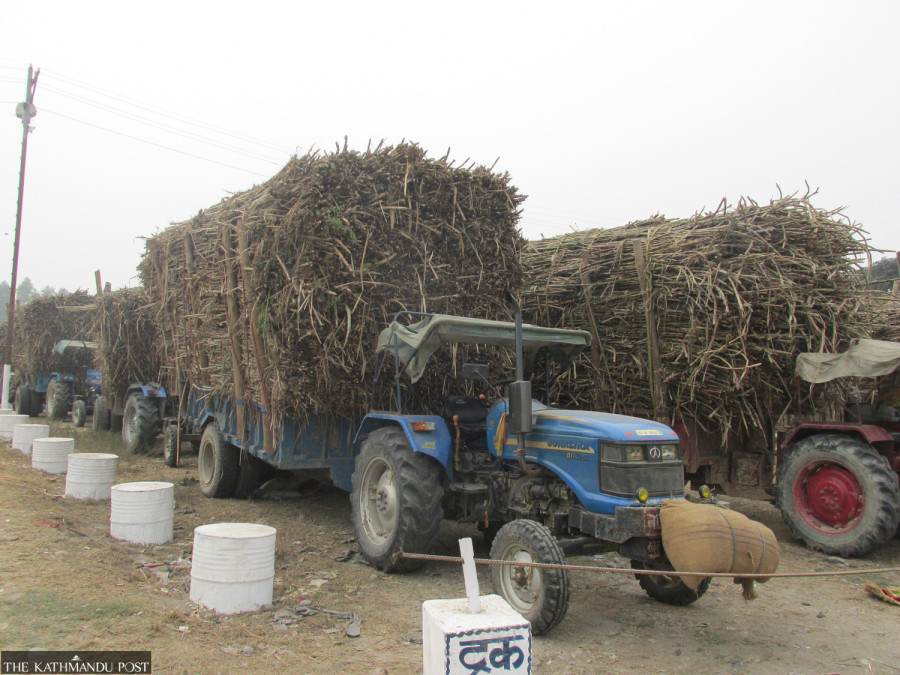Money
Sugar mills begin cajoling farmers after suffering sugarcane shortage
Factory owners have been visiting farmers to encourage them to plant sugarcane by offering different schemes, farmers say.
Krishana Prasain & Shiva Puri
Tired of having to beg for their money from non-paying sugar mills every year, sugarcane farmers in Rautahat began switching to other crops, leading to a steep drop in output.
The first casualty of the resultant raw material shortage has been Baba Baijunath Sugar Mill, which announced it was shutting down even before the end of the crushing season.
News stories about sugar factories in the Tarai plains delaying payment to farmers for their harvests appear regularly in the media. Cane growers have even staged demonstrations to press their cause. Frustrated farmers in Rautahat decided they had had enough.
Baba Baijunath Sugar Mill, the only sugar mill in the district, said it was closing down a month and a half before the end of the crushing season because it was short of sugarcane.
The mill located in Katahariya Municipality, has a capacity to crush 2,000 tonnes of sugarcane in a season or 20 tonnes daily. But this year, the mill was forced to shut down early after crushing only 600 tonnes of sugarcane.
Usually the crushing season begins in February and runs till mid-May.
Kapil Muni Mainali, president of the Federation of Sugarcane Producers Association, said that all 10 sugar mills operating across the country were forced to shut down due to lack of sugarcane.
Mainali said that sugarcane farming, once a popular cash crop for many farmers in the southern Tarai region, have started to switch to other crops because they don’t get good returns. Many farmers have to sell their harvest on credit.
“Besides, the government and the mill owners work together to fix the minimum support price of sugarcane,” Mainali said.
The price of sugarcane has not increased since 2005, but the price of sugar has jumped to Rs90 per kg from Rs62 in the last three years.
Baiju Babara, the owner of Baba Baijunath Sugar Mill, said they had to shutter the mill because sugarcane production in the district dropped this year.
“The mill used to remain in operation till the end of April. As there was no sugarcane, we decided to close down the factory one and a half months early,” he said.
Another sugar mill in Rautahat district, Shree Ram Sugar Mill, has been closed for a year. It went belly-up after making a Rs350 million payout to sugarcane farmers for their crops that had remained outstanding since 2014.
The mill was opened in 1992 and had been buying sugarcane from farmers in Bara, Parsa and Rautahat. It had a capacity to crush 300,000 tonnes of sugarcane in a single season.
Babara said his sugar mill was running at a loss. Baba Baijunath Sugar Mill came into operation on December 30 last year.
“We had set a target to crush 2,000 tonnes of sugarcane, but we didn’t get more than 600 tonnes. It’s difficult to run the factory in this way,” he said.
Sugarcane cultivation in the eastern Tarai districts has been declining for the last six years after many sugar mills stopped paying farmers on time.
Nearly 18,000 farmers were growing sugarcane till about six to seven years ago. The number of farmers has dropped to 6,000, according to the Sugarcane Producers Association, Rautahat.
With the number of sugarcane farmers constantly falling, Baba Baijunath Sugar Mill has been trying to entice them by offering various facilities. It has already paid the farmers for their sugarcane of this season, according to Mainali.
The mill said it had been issuing invoices to the farmers and launched an early payment scheme. "It has also provided the farmers with seeds and fertiliser," said Ashok Jaiswal, president of the Sugarcane Producers Association, Rautahat.
The mill handed over a cane harvester, a modern machine, to the farmers recently.
Unnerved by the drop in sugarcane production, mill owners have been visiting farmers to encourage them to plant sugarcane by offering them different schemes, farmers said.
Jaiswal is optimistic that more farmers will plant sugarcane in the coming years. "In the past, farmers faced difficulties getting their payment. So they stopped planting sugarcane,” he said.
Mainali said farmers had become more willing to grow sugarcane. “The result will be visible in the future. The combined production of all sugar mills in the country came to 120,000 tonnes from this year’s harvest,” he said.
"Nepal's annual sugar requirement totals 350,000 tonnes," he said. “Sugar production has plunged by more than 50 percent.”




 9.89°C Kathmandu
9.89°C Kathmandu
















